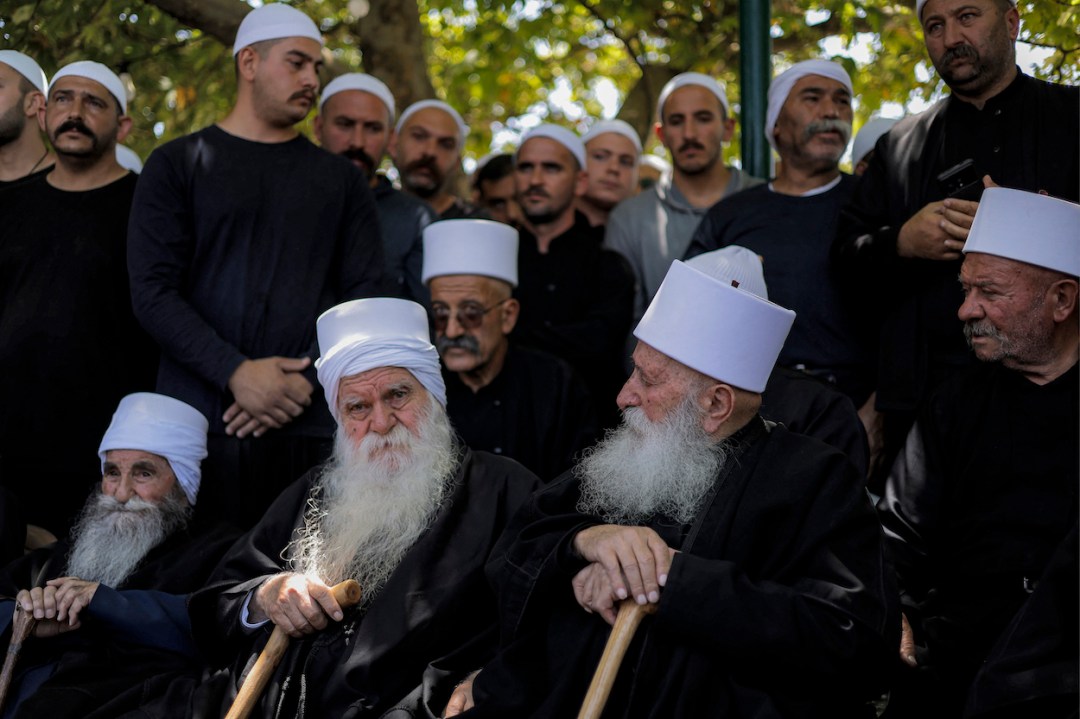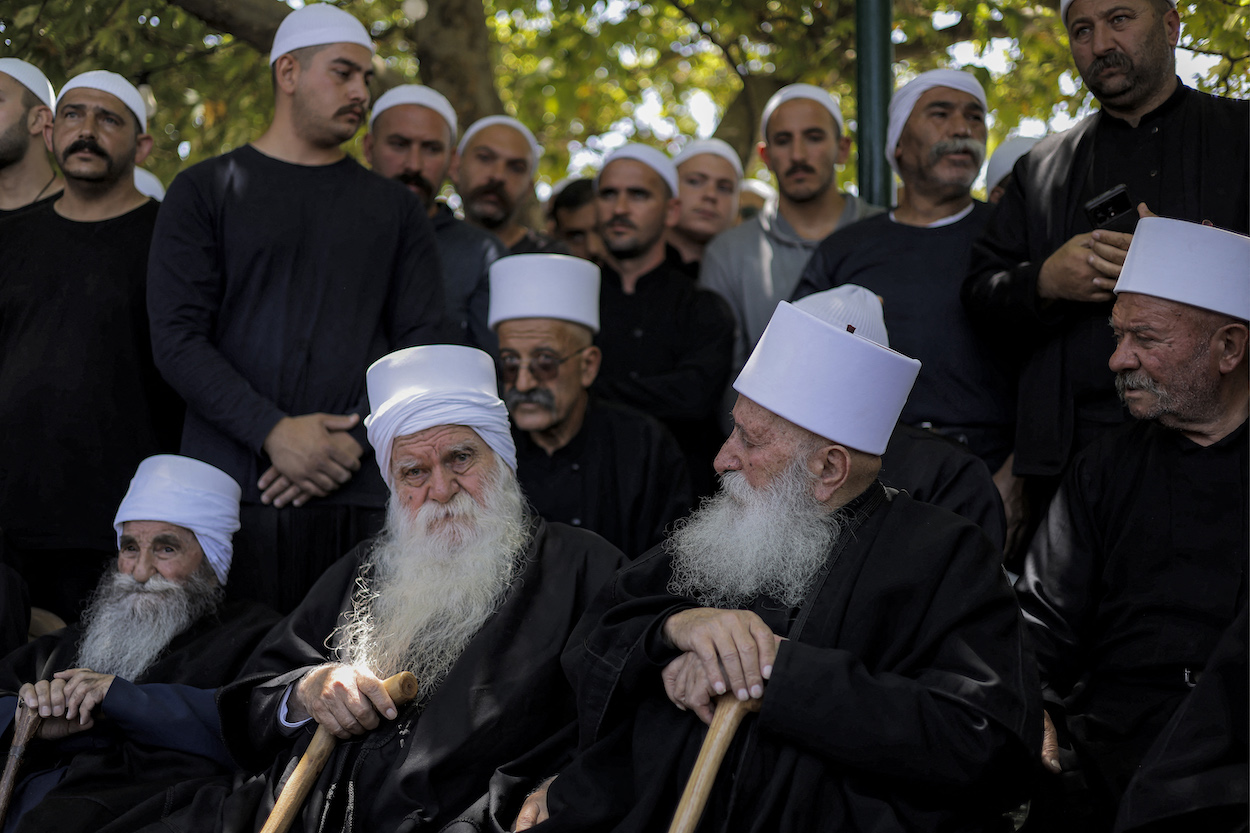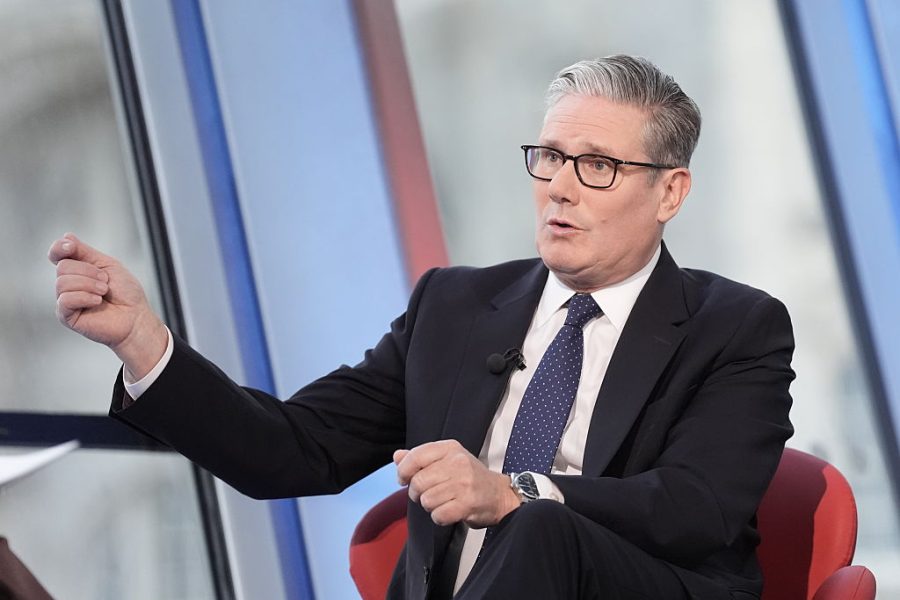Over 500 people are estimated to have been killed in the ongoing sectarian clashes between the Druze and Bedouin populations in Syria’s southern Suweida province this week. Vowing to protect the local Druze, and backing the community’s militia, Israel has bombed Syrian government forces around Suweida and launched missiles on Damascus. While Syria’s interim president Ahmed al-Sharaa has promised to safeguard the minority community, and has announced the withdrawal of troops from the area, his government forces have been directly involved in attacks against the Druze.
Druze civilians have been indiscriminately killed in ‘field executions’ by Syrian government forces and their allies. A militia affiliated with the government have also been looting and burning homes, and have been recorded forcibly shaving the moustaches of Druze men in line with Salafi Islamist dictates. Radical Islamists have vowed a ‘jihad against Druze’ in recent weeks.
An Arab esoteric religious community that evolved from the Ismaili branch of Shia Islam, the Druze self-identify as a distinct religious group. There are significant numbers of Druze in Syria, Lebanon and Israel. Roughly half of the around one million global Druze population live in Syria, the vast majority of them in Suweida’s Jabal al-Druze region. The Druze have been dubbed heretics by radical members of both Shia and Sunni sects of Islam, who deem many of the community’s beliefs, such as theophany and reincarnation, as sacrilege against Islam. From the Shia Fatimid Caliphate, to the Sunni Ottoman Empire, multiple regimes have sought to cleanse the Druze.
Al-Sharaa’s al-Qaeda affiliated Hayat Tahrir al-Sham (HTS) follows the jihadist ideology rooted in the teachings of 13th century Salafi theologian Ibn Taymiyya, who called the Druze the ‘most deviant infidels’, urging that their property be seized, women enslaved and the men ‘killed whenever they are found.’ Killings of Druze civilians, and clashes between sectarian militia in the region, have increasedsince the HTS toppled the Bashar al-Assad regime in December. The Israeli Druze community, up to 80 per cent of whom enlist in the Israeli Defence Forces, have urged their country’s leadership to safeguard their besieged brethren in southern Syria. Even the Druze population of the occupied Golan Heights, many of whom have refused Israeli citizenship, has welcomed Israeli action in Syria. Sheikh Hikmat al-Hajari, the spiritual leader of the Druze community in Syria, has been requesting international intervention for weeks, insisting ‘Israel is not the enemy’. But where Benjamin Netanyahu has justified Israeli airstrikes in Syria has being designed to ‘protect our Druze brothers’, the Israeli prime minister has much to gain from a demilitarised Suweida and southern Syria. The region can serve as a buffer between Israel and countries hostile to its existence, which might best be guaranteed by propping up an independent Druze state.
An autonomous Jabal al-Druze, which means the mountain of the Druze, had briefly existed under the French mandate between 1921 and 1936 encompassing what is now the Suweida province of Syria. The name Jabal al-Druze had originally been used for parts of Mount Lebanon where independent Druze rule had existed under the Ma’n dynasty. These regions not only have significant Druze, but also Christians, another community in the region facing calls for elimination at the hands of Islamists. A grotesque reminder of the same was given last month when over 60 people were killed in the Mar Elias Church bombing in Damascus. This has prompted aspirations to rekindle the Maronite-Druze dualism that founded modern day Lebanon. The persecution of Christian community in the region, and the rise of Islamist forces recently exemplified by jihadist outfits such as Hezbollah, has reduced the Christians in Lebanon from constituting over 53 per cent of the population in 1932 to today being estimated to be under one third. Even though movements for the creation of a separate homeland haven’t yet been taken up by the vulnerable Christian and Druze minorities in the region, it might have become an existential question for them today.
While consolidating a Druze state with significant Christian population might serve Israel’s geopolitical interests, the Jewish state needs to reflect on its own relationship with these communities as well. The Israeli Druze have protested against the 2018 law that established their country as a nation state of Jewish people, relegating religious minorities to the secondary tier with regards to the state’s recognition of them, in turn tarnishing Israel’s claims of being the sole secular democracy in the region. Far-right Jews, including some in Netanyahu’s government, have also frequently attacked these communities. Safeguarding Druze autonomy in their historical homelands, while pushing for an ethnic cleansing of Gaza, is a leaf out of gory Islamist duplicity. It is hardly surprising that the Muslim world hasn’t expressed any concern for the long victimised Druze community, and has not championed their right to self-determination.








Comments